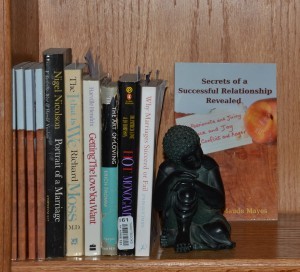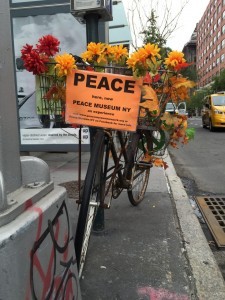Maude Mayes's Blog: Secrets of a Successful Relationship Revealed, page 105
November 22, 2015
How to Reach Agreement Without Compromise
 There are many methods for solving problems and making decisions that couples employ. One of the more popular ones is compromise. This can be a good technique for avoiding conflict for many relationships. Instead of digging your heels in and refusing to yield an inch, it works by trading off. Each party gives up certain positions in exchange for achieving other goals, with each side ideally giving up roughly the same amount. This balance may apply to an individual situation or, as is more often the case, average out over a longer period.
There are many methods for solving problems and making decisions that couples employ. One of the more popular ones is compromise. This can be a good technique for avoiding conflict for many relationships. Instead of digging your heels in and refusing to yield an inch, it works by trading off. Each party gives up certain positions in exchange for achieving other goals, with each side ideally giving up roughly the same amount. This balance may apply to an individual situation or, as is more often the case, average out over a longer period.
The very principle behind compromise suggests that it is necessary to give something up in order to get something else, so loss or defeat is an intrinsic aspect of the process. Each one wants to reach a place of agreement (hopefully!) and so each party gives some of their desires up to accommodate their partner, and try to reach a working decision or solution.
There is nothing wrong with this approach, but it is very different from ours. We do not use compromise for making decisions and reaching agreement. Instead, we have found a process by which neither of us winds up giving anything up. Neither does one of us wind up getting “their way”, as it were.
It works because there are nearly always other routes, other choices that we have not thought of or examined closely. By not being attached to our original position, we can hear each other’s viewpoint and learn why our partner feels the way they do. These two pieces of information change our view of the situation and allow us to find alternate possibilities. We get the chance to see another vision that is different from the one we are holding. By listening with the intention to hear, by remembering that we are both on the same side, by having the intent to discover mutual solutions, we explore alternatives and discuss why they do and don’t work for us.
By continuing this process of exploring alternate possibilities, new possibilities emerge which are not the position that either of us began with. We eventually find a place that works for both of us, one that still includes the elements that are important to each of us.
This new solution is one that neither of us started with, and probably couldn’t have found individually as it is the product of a shared consciousness. It is something we have co-created. The solution is always a surprise and an enrichment for each of us, and the more we practice this, the easier and more fun it becomes.
So if you want to experience a new way of handling decision making and problem solving, try a new adventure. The key to it is not being attached to your original position. You don’t always have to give something up to have a mutually satisfying result!
Note: for a step-by-step description of how to do this, sign up for our relationship newsletter in the box on the right (or below on your phone), and get a written and audio version of the chapter on Our Process from our forthcoming book How Two: Have a Successful Relationship.
00
November 18, 2015
Successful Relationship Reading Corner
We blogged this week on the importance of continuing to appreciate your partner and not taking taking them for granted. Here are some posts on the same subject that we think you’ll enjoy.
4 Tips to Stay Awake in Your Relationship “Do you ever feel your life is like Ground Hogs Day? You do the same thing day after day – get up, make the bed (maybe), shower, make breakfast (and lunch for the kids), go to work, come home, cook dinner (or order fast food), take the kids to sports, supervise homework, fall into bed; and then – – before you know it – – the alarm goes off and you are doing it again?”
What To Do When Your Partner Starts Taking You For Granted A long article with 16 therapists addressing this question; long, but worth reading to the end.
12 Signs Your Boyfriend Is Taking You For Granted This post is oriented towards couples who are dating “The honeymoon stage is over…sometimes one person starts to take the other person for granted without even really realizing it.”
00
November 15, 2015
For a Successful Relationship, Appreciate Your Partner
 We’re sure that when you first met your partner, there were many things that you appreciated, and you’ve probably noticed many more since then. But it’s very easy to get used to them little by little until they blend into the backdrop of life. At that point, the cup of coffee that she brings you, those groceries he’s helping to carry in from the car – these little acts often go unrecognized.
We’re sure that when you first met your partner, there were many things that you appreciated, and you’ve probably noticed many more since then. But it’s very easy to get used to them little by little until they blend into the backdrop of life. At that point, the cup of coffee that she brings you, those groceries he’s helping to carry in from the car – these little acts often go unrecognized.
When acts like these, whether large or small, are not acknowledged, they atrophy and die. A resentment grows, a sense of not being appreciated. The way to avoid this slide into non responsiveness is to be present. Every cup of coffee becomes its own unique offering, different from every other time. When you truly experience the moments of your life, and don’t take things for granted, life is so much richer and more fulfilling. The same can be said about relationships.
Maude: I was looking at Phil last night and so enjoying the way he smiles and the sound of his voice. I felt wrapped up in his warmth and in his loving feelings and behavior towards me. And it really struck me: I never take our time or this man for granted. I am so appreciative of how open he is and how much he shares of himself with me. It is so fascinating for me to experience this person who is really entirely different than me, even though we share the same core values and many of the same goals and intentions. And while I do feel safe and comfortable and very much accepted and appreciated, I never stop enjoying our shared life and all the little precious moments that make up that life.
One of the great secrets of a successful relationship is not to fall asleep; to treasure your time together. Don’t get so busy, or so filled with work or worldly concerns that you cut off the very antidote to all that external pressure: that wonderful peace that becomes your reality in a relationship with mutual intention.
And do not forget to let your partner know, often and in different creative ways, just how much you appreciate them. Appreciation and acknowledgment are things we all want and need. Everyone wants to be seen for who they truly are. In the case of your partner, who knows who they are better than you?! Taking the time to remark on the little things, to show your enjoyment of your partner and your pleasure in being with them is a small thing which creates big results. Not only does it make your partner feel good, but it lifts your own spirits to to be awake and aware of the joy right in front of you.
00
November 12, 2015
Successful Relationship Reading Corner
 We recently blogged on How a Peaceful Relationship is Like Riding a Bicycle. Here are some more articles on having a peaceful relationship.
We recently blogged on How a Peaceful Relationship is Like Riding a Bicycle. Here are some more articles on having a peaceful relationship.
How to Have a Peaceful Marriage in a Chaotic World “Ultimately, Inner Peace is not something we create – it is something we tune into. We don’t have to conjure it up or manufacture it.”
A Peaceful Relationship or Keeping the Peace? “After we used the ideas stated below for several years we began to see that they were part of our lives and we didn’t have to stop and think about them so often.”
5 Rules for Relationship Peace “…the fight itself almost always related to the deeper issues of whether the partners felt understood or valued.”
00
November 8, 2015
How Is a Peaceful Relationship Like Riding a Bicycle?
 If you read our blog from last week, you know that belief and intention are the first requirements toward peaceful relating and finding mutual solutions. Once you believe this is possible and you have the clear intention to participate in this type of relationship, it becomes a matter of practice in order to make this a part of the fabric of your experience.
If you read our blog from last week, you know that belief and intention are the first requirements toward peaceful relating and finding mutual solutions. Once you believe this is possible and you have the clear intention to participate in this type of relationship, it becomes a matter of practice in order to make this a part of the fabric of your experience.
Carole and Marty are trying to make a decision about where to go on their vacation, how long to spend away and how much to spend on the trip. They have not developed the practice of looking for mutually satisfying solutions and have not cultivated the belief in that possibility. Each of them is sitting isolated and alone in their thoughts, fears and needs concerning these decisions. They are not listening to each other because their heads are filled with the clamoring ideas about how each thinks it should be. Their anger and impatience build and the room is filled with mounting tensions. Discord and dissonance reign and the reasons they were going on a vacation together are no longer even part of the exchange. Far fetched, you say? Well, some version of this is often how these types of conversations play themselves out when there is no belief and intention toward mutuality of decision making.
Barbara and Johann are also sitting down to plan their vacation. They are all excited about getting to spend time going somewhere together. They are looking forward to planning it together and creating a great and special vacation within their budget. They want to find ways to come to decisions that work for both of them. In fact they believe and intend to do so. They are sure nothing will feel right unless each is happy with it. As they both have this belief and intention, they have spoken their goals aloud to each other. They feel secure that they are being listened to by their partner, because they know they will both only be happy with a solution when it is good for both of them. They see solving problems and making decisions as a fun adventure that they share. Every time they have an experience like this, it teaches them that it is indeed possible, that it feels great, and at the same time, they know a little more about how to make it happen. They certainly find it a much more positive experience than fighting and arguing and trying to be right at their partner’s expense
Having a peaceful relationship is like riding a bicycle. At first, you can’t stay upright; you fall off and argue. But with practice, you get to know what being balanced feels like and what you need to do to maintain it, and pretty soon, you’re riding your bike, and falling off isn’t even an issue anymore.
Learning how to have a peaceful relationship takes a similar course. Some practice is involved, but once you discover the process of making decisions and resolving disagreements without conflict, a whole new way of being together emerges.
Once you have the experience of peace and joy in finding mutual solutions, that experience crowds out all other negative possibilities. It is so strong and empowering to the individuals and the couple together, that it very quickly becomes a pattern and a way of living. So get some bike lessons with your partner, and prepare to enjoy the ride.
Note: for a step-by-step description of how to achieve these experiences, sign up for our relationship newsletter in the box on the right (or below on your phone), and get a written and audio version of the chapter on Our Process from our forthcoming book How Two: Have a Successful Relationship.
00
November 4, 2015
Relationship Reading Corner
Here’s a mix of articles on intention.
The Nature of Intentions in Relationships How important is intention in the growth and development of healthy relationships? Does the good stuff just happen by itself? Can we make our goals, our dreams, our lives, our relationships happen out of sheer will?
Do You Want to Have a Good Relationship? Of course everybody says yes. But do you intend to have a good relationship? What does that even mean?
Do You Want this Relationship to Work? Intention Is a Key to Success An important element in accepting your partner and finding a loving connection is your intention. You have to have the intention to find peaceful harmonious ways of being together, and this has to be something that is a guiding principle and a true value to you.
Transform Your Relationship by Assuming the Best Intentions I used to think he was out to get me. The man of my dreams was continually plotting to undermine my happiness in countless ways, all for some mysterious reason I couldn’t comprehend.
00
November 1, 2015
Why Are Intention and Belief Important in Relationships?
 This week we are speaking individually on the subjects of intention and belief.
This week we are speaking individually on the subjects of intention and belief.
PHIL: There are but two simple steps to having a wonderful relationship: believing such a relationship can exist, and intending to have one.
It can’t be that simple, you say, or everyone would do it. Well, it is, yet they don’t. Let me explain in more detail.
I know this kind of relationship is possible because I am in one, for over 10 years and still flying high. Previously, only one relationship made it past the three year mark. Did I change, did I meet the right person? Good questions, but they have nothing to do with the point that it is possible.
I know this from my direct experience, but you may have to take it on trust, and this is a challenge because many, many sources portray relationships as struggle, as requiring work, as inevitably containing conflict. This Darwinian view, of competition and conflict, sets you up for failure. Repeat after me: difference is not necessarily conflict.
You have to know or at least trust that such a relationship is possible before you can intend to have one. In practice, this means that at the points when you have a choice to introduce a note of discord, don’t do so; instead make a harmonious choice.
There are several reasons why you may think this approach unworkable. Firstly, it sounds like a recipe for acquiescence and defeat. The long answer to that involves discussing the spectrum of acceptance, but here we can simplify it down to saying that in a relationship, some things are deal breakers; they’re simply unacceptable. All else can be handled, and there are ways to do this without conflict, which Maude and I talk about elsewhere.
Another reason you may think this unworkable is that people have reflexive responses to situations. You’ve all heard “He/she made me so mad I couldn’t help myself,” but this says that you don’t own your emotions and you don’t own your responses. You don’t have to suppress your feelings, they are yours, but own them instead of blaming someone else for producing them, and take responsibility for the actions they generate.
When you believe that peaceful relationships exist and that you want to be in one, you have the opportunity at every point to make the harmonious choice, not the discordant one. Take it.
MAUDE: Intention and belief: two words that are keys to successful relationships. They are keys to entering the world of the unknown and coming out with what you want.
Of these two, belief comes first. You have to believe that a peaceful non-conflictual relationship is possible before you are likely to experience it. This sounds like a circular trap. How do I believe in something if I haven’t yet experienced it? Well, I admit this is one of the reasons we wrote our first book, “Secrets of a Successful Relationship Revealed.” We wrote it in order to share the fact that such a relationship exists, and to share our experience of it. If it exists, then it is a possibility for you. Look around you and see if there are relationships with this quality that can help you believe in their existence. Read about it if you don’t see it in your environment.
Once you have the belief that such a form of relating is possible, you have to make it your intention to have this in your relationship. There are many things that you cannot experience, unless you have the intention to seek them and most importantly, to chose them. Peace is certainly one of these. A relationship filled with peace and lacking conflict can only be brought about through clear, strongly held intention.
In any given instance in life, we get many images of what is happening. We get different read outs on how to assess a situation or occurrence. When we have clear intention, we will interpret and act from that intention. Indeed, this is not just a thought. It is a choice of action; to choose to give your energy to mutual solutions, to acknowledge harmony and unity rather than discord and division. Be committed to this outcome and always go for it!
00
October 28, 2015
Relationship Reading Corner
 This week, we blogged on How to Avoid Trouble in Your Relationship: Don’t Keep Score! Be sure to read it.
This week, we blogged on How to Avoid Trouble in Your Relationship: Don’t Keep Score! Be sure to read it.
We also wrote a guest post at Digital Romance: How Making “Lists” Could Be HURTING Your Relationship “In relationships, people often silently add up their grievances on lists. These items can have a wide range of importance, from not getting a promised phone call to hurtful and angry words or actions. For many, the event gets swallowed but not forgotten. It goes on the little secret list in the back of the mind. ‘What’s the harm in that?’ you ask.”
Here are some other great articles on making lists and keeping score.
Why Keeping Score In Relationships Doesn’t Work “Keeping score is a ‘me-centered’ way of operating, by which you’re elevating your role in the relationship to a place of superiority. And if you’re ‘up,’ then your partner has only one place to land: down.”
The Problem With Keeping Score In A Relationship “Keeping score is a behavior that will quickly unravel a relationship. It begins innocently enough, but it ends with huge fights, lots of resentment and plenty of hostility.”
5 Relationship Lists You Must Make Lists of what is important to you can be a great help when forming a relationship. This article offers many important things to consider.
00
October 25, 2015
How to Avoid Trouble in Your Relationship: Don’t Keep Score!
 Making lists and keeping score are really bad things to do in a relationship. Making lists is something we do in our minds and is always about something we have not communicated to our partner. They often involve expectations that we have concerning our partner’s behavior, or they are about needs we have that we haven’t shared. We want something, and when we don’t get it we get disappointed or even angry. We add them to our mental list of relationship sins, listing what is wrong with our partner, why we shouldn’t be in this relationship, and why we feel misunderstood or mistreated.
Making lists and keeping score are really bad things to do in a relationship. Making lists is something we do in our minds and is always about something we have not communicated to our partner. They often involve expectations that we have concerning our partner’s behavior, or they are about needs we have that we haven’t shared. We want something, and when we don’t get it we get disappointed or even angry. We add them to our mental list of relationship sins, listing what is wrong with our partner, why we shouldn’t be in this relationship, and why we feel misunderstood or mistreated.
I was talking with a woman the other day who was very upset and ready to end things with someone she had been dating for a while and about whom she had been really excited. She told me that he never wanted to just spend time hanging out, and that he always wanted to go out to some specific event and would then take her home. She was convinced that he wasn’t really interested in getting to know her more deeply and only wanted a superficial dating experience. I asked her if she ever told him that she enjoyed hanging out and would love to just stay home or go for a walk and enjoy being together. She thought about it and was truly surprised to realize she hadn’t said anything like that to him. When next we met, she was relaxed and very satisfied with her dating. She told me that she had shared her feelings with him and that he was very relieved to hear how she felt. He had been wracking his brain to keep coming up with places to go to make her happy!
Compounding this habit of list making is keeping score: “I did this and he didn’t do anything. I always and he never…” Very often, people measure the worth of a relationship with a balance sheet where, just like a business, the credits and debits need to balance.
Now on the grand scale, this is true. No one should put up with a moocher, an ingrate or a cheapskate. But people keep score about the little things in life – who took out the garbage or washed the dishes or left the lights on or didn’t call home or turned up late or … the list of offenses can go on and on.
In an argument, they get used as ammunition – “Well, you did X last Thursday.” They often have little to do with the original complaint, so the initial skirmish rapidly becomes an entire battlefront, and the one with the longest list and the surest aim will win. The original grievance may get lost amongst all the collateral damage.
These complaints all stem from one big relationship no-no: lack of communication. If we want our partners to know what we need or even expect, we need to tell them what that is. If we haven’t done this and we aren’t getting what we want or need, then we have only one person to blame, and that’s ourselves!
And always remember, when you are sharing something you want, be sure to speak from the “I” so it is clear this is about you and what you desire, and that it cannot be misunderstood as a comment about the other person’s behavior. In order to do this, it is necessary to realize that indeed, these are our own needs, desires and expectations, and actually have nothing to do with who we are relating to, especially if that person doesn’t even know these feelings exist.
When someone knows what is expected or needed by their partner, it changes things dramatically, especially if these things have been communicated in a non-accusatory manner. Every time you truly share about yourself, you create intimacy which will deepen your relationship. Be truthful and don’t be afraid!
00
October 21, 2015
Relationship Reading Corner
Here are some articles on knowing yourself.
are some articles on knowing yourself.
The Importance of Self-Awareness, and How to Become More Self Aware “Self-awareness (sometimes also referred to as self-knowledge or introspection) is about understanding your own needs, desires, failings, habits, and everything else that makes you tick. The more you know about yourself, the better you are at adapting life changes that suit your needs.”
Getting to Know Yourself, What You Like, and What You Want in Life “In some ways, it may seem counterintuitive to have to learn to know yourself. Surely that should be a given, right? Not necessarily. While our experiences clearly helped shape us into the people we are today, this does not mean that we necessarily know who we really are—what we are passionate about and what we want from life.”
Know Thyself! “Coming to a knowledge of the self is no simple task and often goes underdeveloped because we tend to resist it. Our vision of our inner world does not come as naturally to us as our ability to perceive the outside world. It is nevertheless a learnable skill that with some direction, time and effort we can get better at.”
00
Secrets of a Successful Relationship Revealed
We use this blog to continue the exploration of the magic that can be found in a relationship, and the wider implications of peace for the world. ...more
- Maude Mayes's profile
- 8 followers





